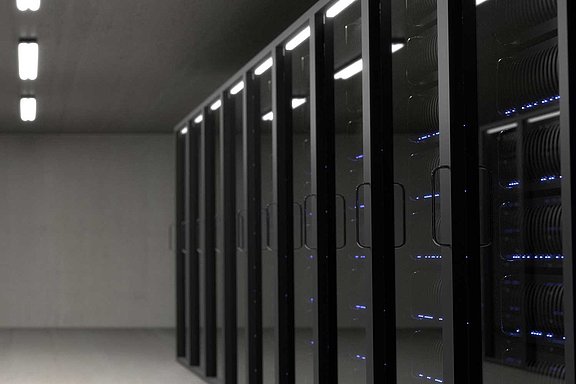Server - infrastructure and security for configurators
Author: Klaus Pilsl
You want to build a product configurator and put it into operation? Of course, the question immediately arises: "What hardware do I need for this? Is what I already have enough or do I need to buy something new? And how costly will this be for me in operation?"
Why is this important?
Product configurators process a lot of data and a lot of logic. The computing power required is usually significantly higher than that required for a normal web server. This is not only because of the more extensive calculations of a configurator, but also because the user:s are constantly making user inputs that need to be processed immediately and as quickly as possible, and the results need to be displayed in real time. This is why the choice of server infrastructure is important - and these servers behind it should be fit.
What are the infrastructure concepts?
We distinguish between:
- Single server: This means that you run your configurator on a single server, which you either bought yourself or rent from a hosting provider.
- Dedicated server farm: This refers to a group of servers that share the load or tasks. Here, too, you have the choice of buying these servers yourself or renting them from a hosting provider. However, since this constellation is more complex and requires more maintenance, the configurator manufacturer usually offers this as a separate service expense for you.
- Cloud: Strictly speaking, we are talking about Software as a Service (SaaS) here. With this concept, the configurator manufacturer already operates a powerful server farm on which many configurators from different customers run simultaneously. You therefore no longer have to worry about operating these systems at all.
Independently of this, there is also this local division:
- On Premise: Means that the server(s) are located at your premises, and operated by you.
- Off Premise: This is when the servers work for them in a third-party data center (e.g. at a hoster or in the cloud).

Configurator checklist
Avoid stumbling blocks.

Important factors in the selection of the server
Scalability
Scalability is the ability of the system to grow with your ever-increasing requirements.
To do this, ask yourself the following two questions:
- Technical scalability: Will these servers be able to cope with growing accesses, increasing technical requirements and future developments in the future, or are recurring additional investments in the infrastructure to be expected?
- Administrative scalability: How does my administrative workload relate to the increasing requirements? Can I manage this myself? Do I have sufficient specialist staff and know-how for this?
The comparison:
- Single server:
a. Technical scalability: This concept reaches its limits most quickly. When capacity limits are reached, the customer experience during configuration suffers. The response time of the configurator drops abruptly, since the requests cannot be distributed to other servers and the calculation request queues fill up quickly.
b. Administrative Scalability: When the capacity limit is reached, fundamental changes have to be made. This is associated with costs and personnel expenditure. - Dedicated server:
a. Technical scalability: In this concept, there is already a so-called load balancer, which distributes the load across several servers. Here, the capacity can be expanded more easily by purchasing individual servers. However, this is also associated with investment costs (purchase or rental).
b. Administrative scalability: The system is basically already designed for scaling. The administrative activities are therefore predictable. - Cloud:
a. Technical scalability: This is referred to as an automatically load-scaling system. This means that the system automatically adds resources depending on how much is needed. This is possible because servers (referred to as instances), individual services or storage capacities can be added or removed program-controlled and fully automatically in the data centers. This guarantees maximum performance, almost unlimited scalability and maximum response speeds even with high loads.
b. Administrative scalability: The system is operated centrally by the configurator manufacturer in cooperation with the cloud provider. Therefore, there are no administrative activities for server operation. Neither for normal operation nor for scaling measures.
Reliability
As soon as the configurator is used in live operation, it generates decisive added value for customers and the company. This increases the importance of the configurator and the participants rely more and more on it working smoothly. If the configurator were suddenly to be impaired or even fail, this would have a negative impact on business.
There are many triggers that affect reliability, such as.
- Hardware failures (storage systems, fan contamination, lightning, etc.)
- Software error (memory overflow, update error, operating error, etc.)
- Environmental effects (power failure, fire, water, overheating, etc.)
- and much more
Therefore, reliability should be an important decision criterion for you.
The comparison:
- Single server:
- When this server fails, the configurator operation also fails. If this is the case, an administrator must begin the recovery process (identifying the cause, troubleshooting, finding a solution, repairing, restarting the server).
- The recovery can take a few hours to several days, depending on the error. The configurator is not available during this time. - Dedicated server:
- If a single server fails here, the failure is automatically picked up by another server in the farm. As a rule, the service continues to run without interruption and the administrator can take his time to repair the damage while the farm continues to operate. However, there are also causes where the entire operation can fail: for example, the failure of non-redundant components such as firewalls, load balancers or storage systems.
- The system is therefore well equipped for many failure scenarios, but in special cases a recovery time of a few hours to a few days must also be taken into account. - Cloud:
- In this case, the system has a different technical structure. The software is not created for individual servers, but is organized into individual services, all of which operate redundantly and with high availability in the cloud. In addition, the system is hosted by a professional cloud provider, who takes care of the tested update and upgrade strategy, online availability and security, service provisioning, and much more.
- This concept has the highest availability and reliability.
- But there is no 100% reliability here either. Causes that can also lead to a failure here are, for example, human errors.

Security
The topic of security deals with the question of how well a system and its data are protected against unauthorized access, sabotage, misuse and data theft. This is important to ensure unrestricted operation and protect confidential data.
To ensure a sufficient level of security, various measures are useful, such as: Measures against unwanted access (intrusion prevention), physical network security, communication encryption, measures against data theft, physical access restriction and monitoring, recovery procedures, employee training, and many more.
The comparison:
- Single server:
- In this case, you need to take care of all measures: From physical access to the server room, to network security, firewalls, authorization management, security software with maintenance, remote access, monitoring, etc.
- Only if you run the server not in your own house, but with a hosting provider, they can take over some tasks from you, such as: physical access controls, firewalls, etc.
- In an emergency, however, you yourself must recognize the incident, take action and initiate measures. - Dedicated server:
- The same applies to a dedicated server farm as to a single server. The server maintenance is only for several servers.
- This increases the effort for the measures, but at the same time it also offers more possibilities for protection through e.g. redundancies. - Cloud:
- Most security tasks here are already handled by the cloud provider.
- The configurator operator takes care of all other safety tasks for you.
- Since one system is used for many configurator customers at the same time, the security effort per customer is significantly reduced and more powerful measures can be implemented from which all customers benefit at the same time.
- However, it is always important for you to handle the access data carefully so that it does not fall into unauthorized hands.
Choice of configurator provider
The choice of server or infrastructure concept is often already made by the configurator provider. Many providers support only one or two of these concepts.
The Combeenation platform only supports the cloud concept. Combeenation cannot run on a single server or on a server farm - for a good reason: Combeenation's goal is to relieve customers of all server-related administration tasks and to offer a system with maximum scalability, security and reliability. So that you can fully concentrate on the configurator as a sales booster, on your product and its product data.

Configurator checklist
Avoid stumbling blocks.


